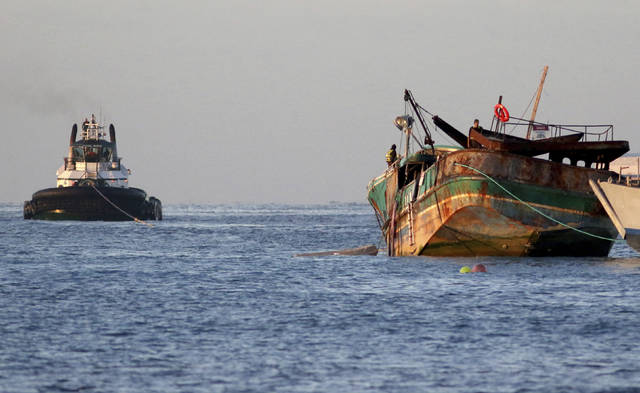HONOLULU — A commercial fishing vessel carrying foreign workers that ran aground and later burned and leaked fuel just off the beaches of Waikiki was towed out to sea Thursday and will be sunk by a team of salvage workers.
After being patched up and filled with foam to regain buoyancy, the 79-foot (24-meter) Pacific Paradise was hooked to a tug boat and hauled into deeper water as a crowd of people on the beach cheered.
An attempt to tow the boat to sea Wednesday failed after it was removed from the reef but then became stuck again in a shallow, sandy area about 600 feet (183 meters) away, forcing salvagers to wait until high tide Thursday morning.
“The current plan is to get it out about 13 miles (21 kilometers) offshore, that’s south of Oahu, to an EPA-approved disposal site,” Coast Guard Chief Petty Officer Sara Muir said. “It should sink to about 1,800 feet (550 meters).”
Officials say there could still be up to 1,500 gallons (5,678 liters) of fuel remaining on the boat when it sinks.
The crash raised new questions about the safety and working conditions of foreign laborers in the Hawaii fleet. No one aboard called for help when it crashed, and rescue teams responded to eyewitness reports. They rescued 19 foreign workers and an American captain, who were then taken by U.S. Customs and Border Protection agents to a pier to be interviewed and placed on other boats.
“There’s a little bit of concern as to why there was so many crew members onboard,” said Honolulu resident Jeff Olin, who was at the beach Thursday to watch the removal. “That’s definitely another part of the equation that needs some answers to.”
The vessel usually has a crew of six, and while it was unclear exactly how many bunks were on the Pacific Paradise, similar boats typically have no more than 10 beds for crew to sleep. It would have taken at least 12 days for the boat to make it from American Samoa, where it picked up the Southeast Asian crew members, to Hawaii.
The Pacific Paradise — based in Honolulu and used to catch tuna in the Pacific — smashed into the shallow reef just before midnight on Oct. 10 in about 6 feet (1.83 meters) of water just a few hundred yards offshore. Days later it caught fire as a salvage team prepared it to be towed, causing extensive damage that slowed its removal and sent fishing hooks, fuel and oil into the ocean.
A 2016 Associated Press investigation revealed the fishing fleet exploits a loophole in federal law to employ men from impoverished Southeast Asian and Pacific nations for a fraction of the pay an American worker would get, with some making as little as 70 cents an hour.
The men do not have authorization to enter the United States, so they are confined to boats while docked in Honolulu and not eligible for most basic labor protections. The AP report revealed instances of abuse and claims of human trafficking among the fleet.
Under the law, U.S. citizens must make up 75 percent of the crew on most American commercial fishing boats. But in Hawaii, the loophole carved out to support one of the state’s biggest industries exempts commercial fishing boat owners from the rules enforced almost everywhere else.
The recently introduced Sustainable Fishing Workforce Protection Act would close the loophole that has allowed the Hawaii fleet to employ the workers.
A banner reading “end slave-like labor in Hawaii longline fishery” had been placed on the beach near the wreck by an activist from Turtle Island Restoration Network, which has filed a complaint with the Inter-American Human Rights Commission.
Dylan Bedortha, the group’s advocacy associate who set up the sign, formerly worked as a National Oceanic and Atmospheric Administration observer in Hawaii’s longline fishing fleet. He said the conditions he saw on the boats as a federal employee made him change his career path.
“It took me a couple of years to really let all that sink in and see what was actually going on on some of the worse boats that I was on,” Bedortha said. “I decided to take a different direction and step into the conservation side of things.”
The commission is an autonomous body of the Organization of American States and works to protect human rights. The U.S. is a member.
The complaint asks the commission to determine the responsibility of the U.S. government for human rights abuses against foreign workers in Hawaii.
Most of the foreign workers aboard the Pacific Paradise were from Vietnam, Indonesia, Philippines and Kiribati, and they were not part of the regular crew.
Officials said the boat was not on a fishing trip before it crashed.
The boat is owned by Honolulu-based TWOL LLC. The company’s lawyer, Bryan Ho, a longtime fishing industry attorney, has declined repeated requests for interviews.
The 20 men were at sea for at least 12 days before the vessel crashed, the minimum time it would take to get from American Samoa to Hawaii, according to fishing industry experts.
Once rescued, they met U.S. customs officials and were escorted to a pier in Honolulu to begin work on other boats.
Another fishing vessel with foreign crew members, the 57-foot (17-meter) Jane, took on water and capsized about 110 miles (177 kilometers) off Hawaii’s Big Island on Nov. 27.
The crew sent a mayday call and got into a life raft before being rescued by another fishing vessel.





